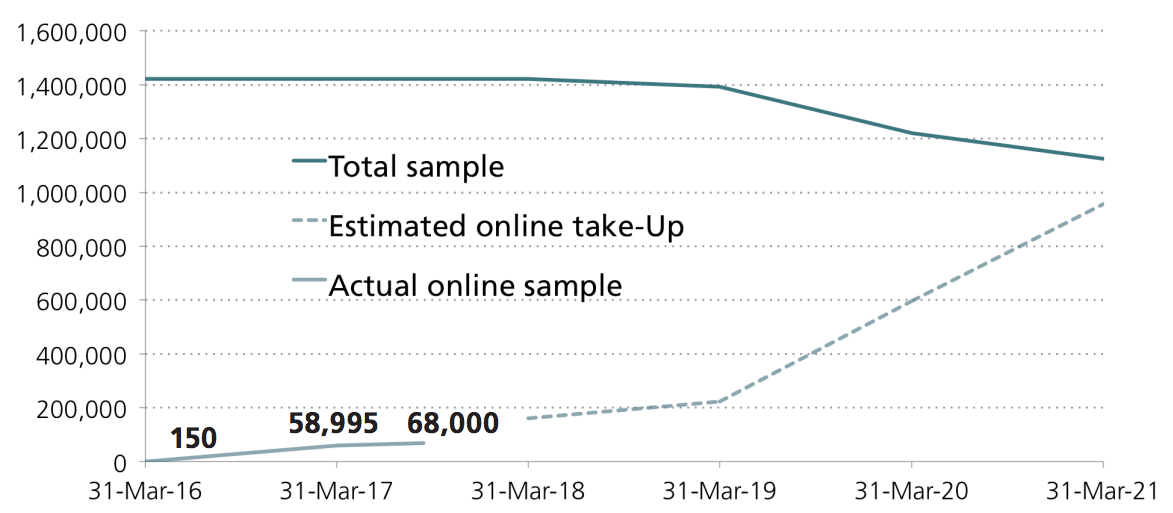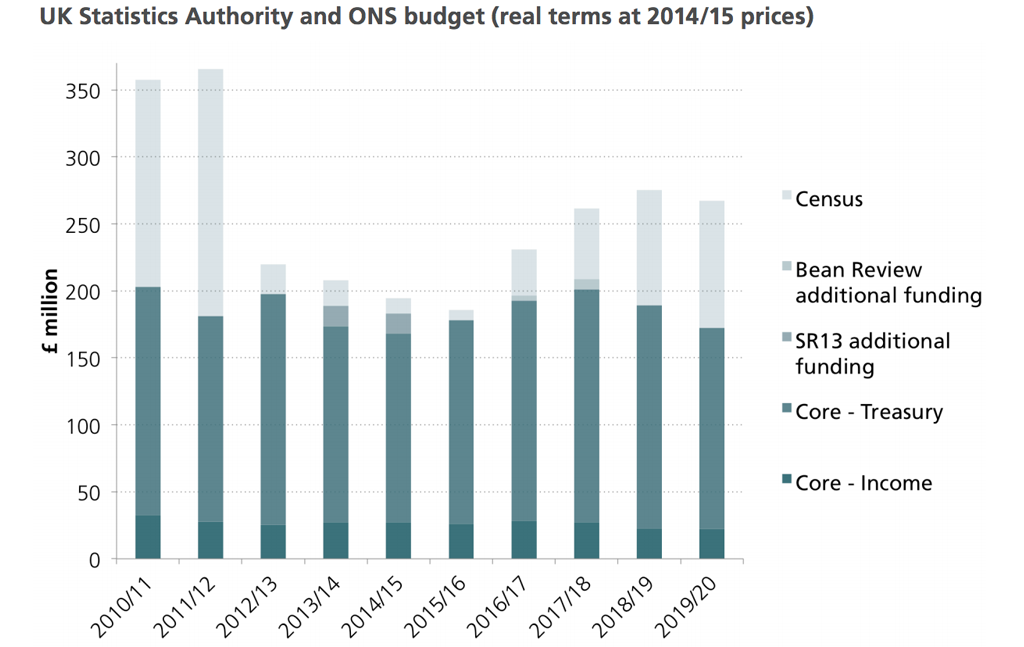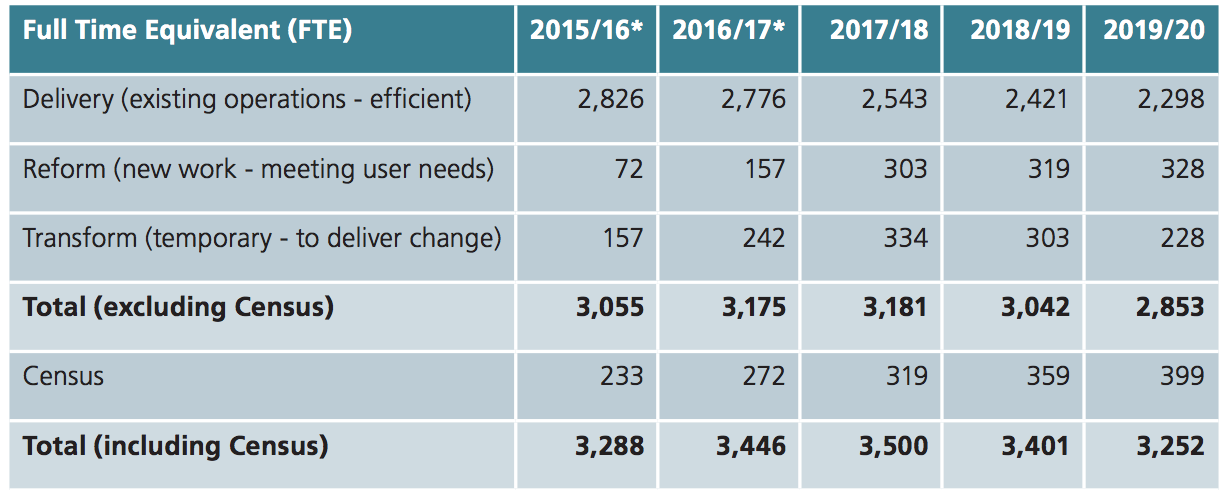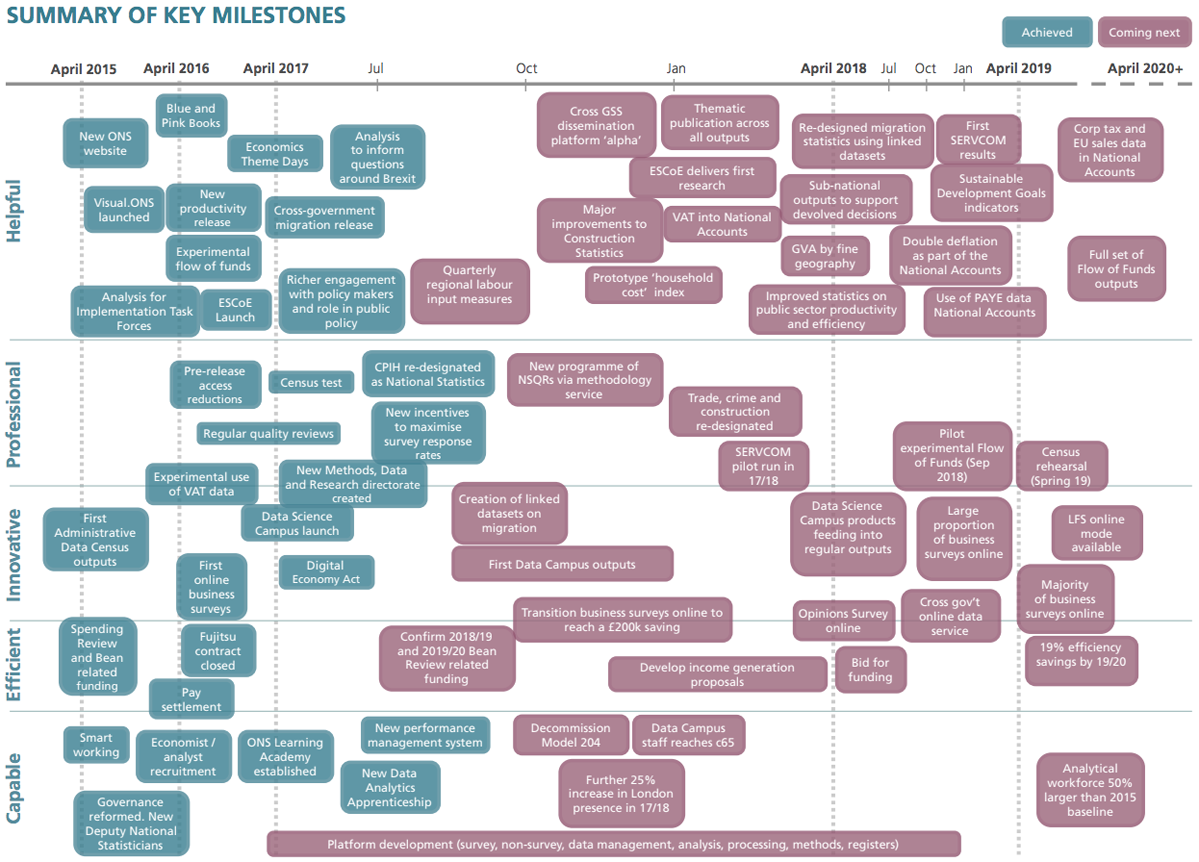Introduction
In the introduction to our strategy, Better Statistics, Better Decisions, I said that in five years’ time statistics would be radically different. Three years on we have made a great deal of progress. We are on track to realise our ambition to mobilise the power of data to help Britain make better decisions.
The UK has important decisions to make. On EU exit and our place in the world, the macroeconomy and industrial strategy, population change and migration, health, security and many more. To inform those decisions clear insight is needed quickly, in fine grained forms and targeted on the issues at hand. There are many excellent examples where we are reaching the mark. We will design all our services to be helpful to government, business, communities and individuals when important choices and judgements are being made.
The data revolution has created previously unimaginable sources of information for us to work with for the public good. Over the last three years this revolution has gathered pace and is transforming our lives ever faster. We have been adept at recognising the possibilities and developing technologies. We are investing in our own skills and capability. Through restless curiosity and innovation we will make the most of what is possible.
Our professionalism earns us trust. We have no axe to grind in any debate save that it is well informed. We need to cherish our values of honesty, integrity, objectivity and impartiality.

By respecting the interests of those whose data we utilise for public benefit and by never straying from description into advocacy we earn our licence to operate. Outstanding communication of our findings and our ethos is essential if we are to ensure that good evidence is used in the service of democracy.
The best is yet to come. With your help over the next two years we are poised to deliver on our transformation and realise the possibilities we outlined three years ago.
John Pullinger, National Statistician
October 2017
Our strategy: better statistics, better decisions
Mission: To mobilise the power of data to help Britain make better decisions.
The five perspectives of our strategy provide a framework to set out our personal objectives and assess progress.
| Helpful | Statistics play a central role in the functioning of democratic society, enabling sound decisions and supporting public debate. They serve those in power and also those seeking to hold the powerful to account. |
|---|---|
| Professional | To be helpful we must be professional. When we collect data, citizens and businesses are trusting us to keep it secure and use it for the public good. When we publish statistics we want users to trust that we provide a fair view. |
| Innovative | We have to make a step change in our thinking, being restlessly curious about how we can do better. We must change fast enough to take advantage of the rapidly increasing range of data sources. |
| Efficient | We must play our part in driving efficiency, while also demonstrating that the value we deliver to businesses, citizens and government is substantially greater than the costs. ONS will deliver a 19% real terms reduction to core funding by 2020. |
| Capable | To achieve our goals we must transform our capability. We are using tools and techniques to draw insights from data which were not possible just a few years ago. The change will be cultural as well as technological. We must be more collaborative, open and flexible in how we work. |
Priorities for change
Our strategy sets out three priorities for change: economic statistics; contributing to public policy; and building data capability. These continue to be our priorities. We have many successes already to celebrate.
- Economic statistics: supported by Sir Charles Bean’s review, we have established an Economic Statistics Centre of Excellence. We have made improvements to statistics on productivity, prices and trade.
- Public policy: we have reimagined the census and our approach to data collection to underpin a cheaper, faster and more fine grained ability to address public policy concerns. We have made improvements to statistics on migration, education, health and crime.
- Data capability: we have opened the Data Science Campus in Newport and now have important legislation on the statute book through the Digital Economy Act. We are making improvements in the skills of our staff, forging new partnerships with those who can help us and transforming our digital and technology estate.
Target operational model
The Office for National Statistics (ONS) is at the heart of the UK official statistics system. Transforming the way it works is central to our strategy and will provide benefits to the wider Government Statistical Service (GSS).
To allow ONS to transform with confidence we have developed a high-level picture of our future state. This target operating model gives a picture of how ONS will look and feel in 2021, and how our products, processes, systems and people will change in response to the ever-changing needs of our customers.
Helpful
What have we achieved?
The first two years of our strategy were focussed on getting our plans and leadership in place, securing investment, and beginning to transform our systems and capability. That laid the groundwork for the third year, where we moved decisively into the delivery of better statistics. Below are some examples of benefits to our customers.
What our customers said
“The need for timely and accurate ONS statistics is of increased importance given the scrutiny around economic developments in the run up to and following the EU referendum … We welcome recent efforts in developing the first set of Flow of Funds statistics. This is essential for evaluating the interconnectedness of the financial system.” – HM Treasury
“The Bank would like to thank ONS for their efforts in ensuring that the publication of the 2016 Blue Book and the reweighting of the labour force survey ran smoothly, and for the improvements to the production of CPIH. ONS statistics are crucial to our work and we strongly appreciate your continued efforts to provide us with the data we need to make effective policy decisions.” – Bank of England
“Brilliant work by ONS. What’s changed since Brexit? Draw on the chart and see how accurate you are.” – Joshua Graff, Head of LinkedIn UK
“Thinking #CrimeCalculator may come in useful when deciding which Police Commissioner candidate to vote for.” – Twitter user
“In recent times, ONS has paid much more attention to its communications with users – clarity in particular has improved. Also there has been more assembly of different pieces of analysis into something approaching an integrated view of an area, e.g. the economic reviews.” – Customer survey respondent
Better statistics
New experimental ‘Flow of Funds’.
New productivity statistics published quarterly.
Improvements to GDP and the Balance of Payments in the Blue and Pink Books.
Fraud and cyber crime now included in crime statistics.
A series of ‘living abroad’ articles informing questions around Brexit.
Longitudinal Education Outcomes data brought together by the Department for Education to track the progress of school leavers into higher education and the labour market.
New insight on challenging areas like domestic violence, the state pension age review, suicide prevention and local area estimates of income.
Statistical advice to the Implementation Task Forces delivering on government commitments.
Improved communication
New ONS website.
New economic theme days.
Social media increasingly used via a team of ‘tweeting statisticians’.
Visual.ONS helping citizens to interact with data.
What’s coming next?
Better statistics
Progressive improvements to the measurement of the modern economy so that by 2020, especially in the areas of productivity, financial flows, prices and trade, we will be providing the statistics and data that decision makers need.
A full set of ‘Flow of Funds’ outputs by the end of 2019.
‘Double deflation’ introduced as part of the UK National Accounts from 2019.
A new approach to measuring changes in costs to households.
Improved measurement of public sector productivity and efficiency.
New measures of ‘missing capitals’ (human, natural, environmental and intangible).
More timely and granular statistics through the addition of administrative data, with our first priorities being VAT data in the National Accounts in 2017; the production of GVA by fine geography in 2018/19; and PAYE data in the National Accounts from end 2018.
Major improvements to construction statistics including output, price and cost indices.
Redesigned migration statistics which meet the needs of users, working across government to create linked datasets and using alternative data sources.
Supporting decision-making at a devolved level with more sub-national outputs.
Monitoring progress towards UK Sustainable Development Goals.
Improved communication
Expand the thematic publication approach across the whole portfolio of outputs, providing a clearer narrative around UK performance.
Continue to improve the ONS website based on user feedback. Deliver functionality to support the dissemination of multivariate, sub-national and small area data.
Consider the feasibility of a single dissemination platform for all official statistics across the GSS, launching an ‘alpha’ pilot in 2017.
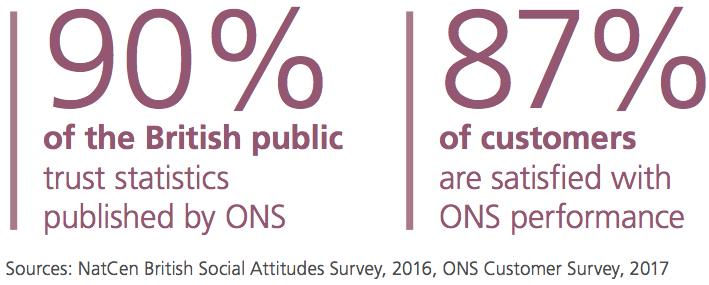
Professional
What have we achieved?
- The National Statistics quality mark is a sign that statistics meet the highest professional standards of trustworthiness, quality and value. We strive to maintain this for all of our key outputs. In 2017, we regained National Statistics status for the CPIH measure of inflation.
- We have conducted 96 quality reviews of ONS outputs.
- We are improving the timeliness of our outputs. In 2016 we launched a flash estimate of labour productivity 60 days quicker than previously. Public sector productivity used to be published with a two-year lag; it is now published within three months.
- We have created a new Methods, Data and Research directorate to provide better methodological services across the GSS.
- We continue to meet international standards. We also shape new international frameworks; for example a new UN City Group on Ageing, based at ONS, aims to improve availability of ageing and age-disaggregated data.
- Keeping personal data secure is absolutely fundamental to us. We have not experienced any data breaches or losses.
What’s coming next?
- We will retain National Statistics status for all our key outputs and regain National Statistics status for Trade, Crime and Construction.
- We will improve the timeliness of outputs to as close to real time as possible.
- We will develop a new programme of cross-cutting National Statistics Quality Reviews and act on any recommendations for improvement.
- Like other statistical offices across the world we face increasing difficulties maintaining response rates for voluntary surveys. This increases the importance of moving towards greater use of administrative data and electronic data collection.

Innovative
What have we achieved?
- Unlocking data. The Digital Economy Act received royal assent in April 2017. When it comes into force in 2018 it will enable much better use of data and clearer assurance for the public on how it is being used.
- The science behind the data. The Data Science Campus opened its doors in 2017 to explore new data sources and techniques.
- Online census. By putting all of the systems and processes in place for the 2017 Census Test we put ourselves in a strong position to deliver a modern census in 2021.
- Online data collection. We have moved several key business surveys online, including the Retail Sales Inquiry, the Monthly Wages and Salaries Survey, and the Monthly Business Survey.
What’s coming next?
- Unlocking data. We will make use of the Digital Economy Act to dramatically increase our use of administrative data.
- The science behind the data. Projects will be completed by the Data Science Campus under its five key themes: urban future; society; sustainability; evolving economy; and UK in a global context. This will lead to tangible benefits in terms of better, more fine grained and real time statistics.
- The 2021 census has the most ambitious target in the world for online collection. A rehearsal in 2019 will be accompanied by a well developed approach to gathering census data from administrative sources.
- Online data collection. All our surveys and the 2021 Census will be designed to make it as easy as possible for respondents to provide data online, with a dramatically improved customer experience. Administrative data will be so embedded in all we do that surveys will only be used to supplement this where needed.
Targets for moving from paper to online business surveys
Efficient
Efficiency
We are on course to deliver a real terms reduction of 19% to core funding by 2020 through increasing the productivity of our business and focussing on the ‘digital dividend’ from online data collection and administrative data. These benefits will largely be seen in future years as we complete our transformation and have been included within our future years’ budget profiles and Spending Review 2015 bids. Through efficiency and the continuous improvement of our processes we have been able to release £5.4 million in efficiency savings in 2016/17 and are on track towards our 2020 target.
Income
We are committed to expanding the ways that we generate income to help support the statistical services we offer. This will be done without detracting from our core remit which is provided free for the public good.
So far, our work in this field has been tentative as our main focus has been on ONS transformation above income generation, but as new capability is achieved this will become a greater focus. We have established a Business Development function to aid identification of opportunities here.
Capable
What have we achieved?
- Our ambitious digital and technology transformation has gathered pace.
- We have established a Learning Academy at ONS.
- We are recruiting more apprentices and we have developed the government’s first Data Analytics Apprenticeship Scheme.
- We achieved our 2016 target of increasing the number of economists within ONS to 100. The first ONS Fellows were recruited. Our London presence has grown by 25% and will continue to grow.
- Establishing the Economic Statistics Centre of Excellence provides new capacity for work with world leading experts.
- The level of staff engagement across ONS increased significantly from 54% in 2015 to 60% in 2016. However, we continue to push to improve engagement to a level comparable to the highest performing organisations.
What’s coming next?
- Transformed digital, technology and methodology services including a systematic upgrade to the user experience; efficient and secure platforms for data processing; and simpler and cheaper ways for data to be collected and verified.
- A transformed workforce with major strengthening of capability in economics, statistics and data science. We will increase the share of ONS staff who are in an analytical profession from 19% of the workforce in 2016 to 28% in 2020.
- We’ll be playing our part in providing an integrated and collaborative cross-departmental Government Analytical Function, bringing together statisticians, economists, social researchers, behavioural insights specialists, actuaries, scientists and operational researchers.
UK Statistics Authority and ONS staffing levels
*actual end-year positions
Download PDF version (1.07 MB)

